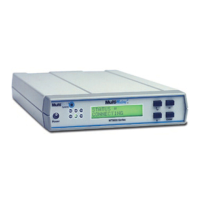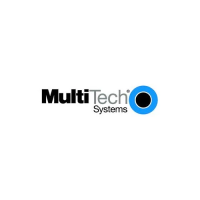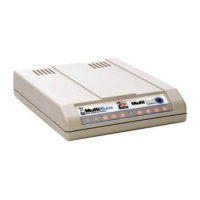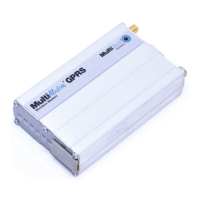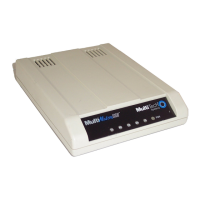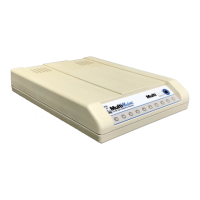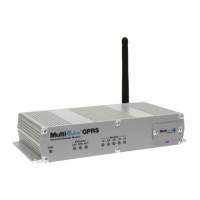Do you have a question about the Multitech MultiModem II MT5600BA–V.90 and is the answer not in the manual?
Detailed overview of the modem's capabilities and supported line types, including leased line and dial-up operations.
Information on where to find AT Command details for product configuration, typically on the accompanying CD.
Lists general, data, and fax capabilities of the modem, including standards compliance and connectivity.
Crucial safety precautions for modem installation and usage, covering electrical hazards and proper wiring.
Step-by-step guide for physically connecting the modem to the PC, telephone line, and power source.
Instructions for installing the necessary software driver for the modem on different Windows versions.
Procedures for configuring the modem for specific country telecommunication standards using LCD or AT commands.
Guide for installing the bundled data communication software package for modem management.
Covers modem configuration methods, LED indicators, and the LCD display's functions.
Explains the menu hierarchy, option selection, and overall structure of the modem's front panel interface.
Details on accessing and configuring Status, Basic, Advanced, and Remote Configuration options via menu trunks.
Configuration and usage of Diagnostic, Phone Number Memory, and Caller ID options through dedicated menu trunks.
Step-by-step instructions for configuring the modem for two-wire leased line connections.
Step-by-step instructions for configuring the modem for four-wire leased line connections.
Explanation and setup of dial backup functionality for leased line failures and automatic restoral.
General steps for establishing and using remote modem configuration for maintenance and troubleshooting.
Default password information and security considerations for initial remote configuration.
Guide to changing the password for secure remote access to the modem configuration.
Instructions for modifying the escape character for remote configuration to enhance security.
Introduces callback security for network protection and outlines methods to enable or disable the feature.
Procedures for assigning passwords and phone numbers for callback security using front panel or AT commands.
Guide on making calls to modems with callback security and reference to relevant AT commands.
A printable form provided for recording callback security passwords and phone number assignments.
Solutions for when the modem's LEDs and LCD are not powered on, focusing on power supply issues.
Steps to resolve issues where the modem fails to accept commands, checking connections and software settings.
Common causes and solutions for dialing failures, including line issues and incorrect numbers.
Troubleshooting steps for unexpected online disconnections, including call waiting and line conditions.
Solutions for problems with the modem failing to answer incoming calls, checking autoanswer settings.
Reasons and fixes for slow data transfer speeds, including UARTs, protocols, and line noise.
Troubleshooting tips for data loss during transfers, focusing on compression and flow control.
Solutions for receiving garbled data or characters, checking transmission settings and line noise.
Steps to troubleshoot Caller ID functionality issues, checking autoanswer and phone service.
Explains conflicts when multiple applications try to use the modem simultaneously.
Compliance information regarding FCC regulations for telecom equipment and telephone company connection.
Requirements for fax message content, including sender identification and date/time.
Canadian regulations and limitations for telecommunications equipment, including ringer equivalence.
Compliance with European Community directives for electromagnetic compatibility and electrical safety.
Notes on how country-specific settings can affect modem compliance with national telecom requirements.
Warning and compliance information specific to New Zealand Telecom, including speed restrictions.
Notice regarding surge protection device requirement for South African usage of the modem.
Comprehensive list of technical details, data rates, compatibility, commands, and features of the modem.
Details MTS's product warranty terms, coverage periods, and limitations of liability.
Steps for obtaining repair services for U.S., Canadian, and international customers, including RMA process.
Information on registering products online and general service procedures for customers.
Contact information and resources for technical assistance, including email addresses and internet sites.
Explanation of firmware, its nonvolatile nature, and the possibility of user upgrades.
Summary of the steps involved in updating the modem's firmware, from identification to restoration.
Procedure to identify the modem model and current firmware version using a terminal program.
Steps to check for the latest firmware version on the Multi-Tech website and compare it.
Instructions for downloading the necessary firmware and Flash Wizard utility files from the website.
Guide to extracting the firmware (.HEX) and related files from the downloaded archive.
Process for backing up and clearing modem parameters before firmware upgrade using AT&V and AT&F.
Detailed steps for performing the firmware upgrade using the Flash Wizard utility and the .HEX file.
Instructions for reprogramming modem parameters after the firmware update using a terminal program.
Overview of installing modems on Linux operating systems, noting driver requirements.
Mapping of PC serial ports (COM1-COM4) to their corresponding Linux device names (ttyS0-ttyS3).
Basic connection and configuration steps for getting the modem operational with Linux.
Steps for configuring and establishing an internet connection using the modem in a Linux GUI.
Specific instructions for establishing an internet connection by connecting to an Internet Service Provider.
Notes on configuring Linux systems for answering incoming calls using the modem.
Detailed explanation of signal names and functions for each pin on the RS-232 interface.
Diagrams illustrating RS-232 cable connections, including 9-pin to 25-pin and 25-pin to 25-pin.
Pinout diagrams for two-wire and four-wire leased line cables, showing RJ-11 connections.
